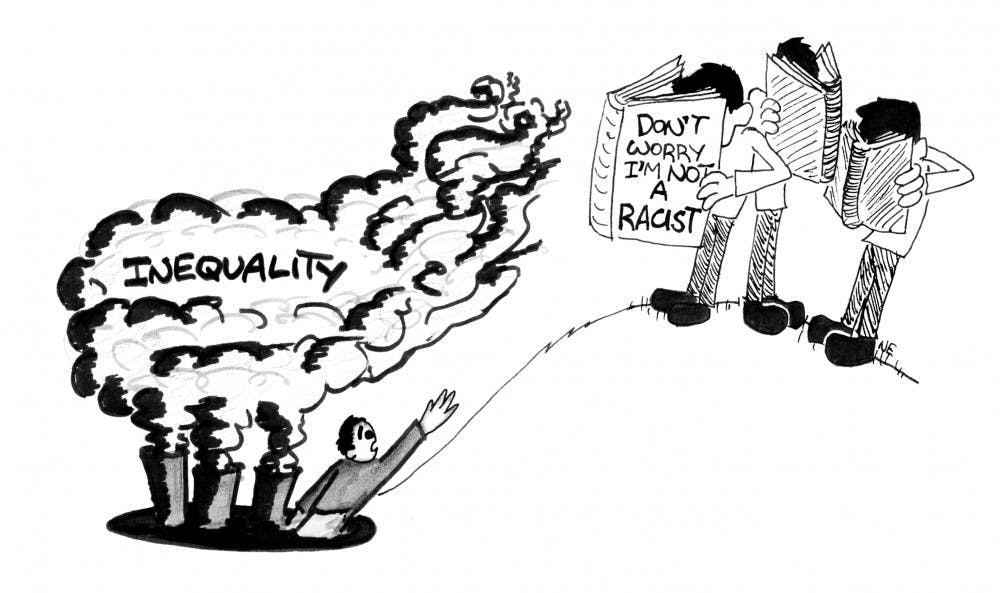In 20 years, our children may ask us where we were when Michael Brown was shot. When Darren Wilson’s non-indictment was handed down. When people took to the streets because they have had enough police brutality, dead children, distorted justice and militarization. Michael Brown’s death was a wake-up call to a nation that has long been deaf to the fact that one black man is killed every 28 hours by the police or vigilantes. Slavery and Jim Crow may be institutions of the past, but their structural legacy is still alive and well, and it will take far more than electing a black president to solve these problems.
At Middlebury, many students find it easy to be apathetic. I am waist-deep in finals, I was travelling for Thanksgiving, I am not a racist — insert any excuse to not engage here. Ferguson may be 1,100 miles away, but Ferguson could be any town. We may not have police shooting students on our campus, but we still face the same racial dynamics that created conditions in which unarmed black teenagers can be legally shot, be it Trayvon Martin, Michael Brown or any other member of this ever growing list of names.
As Tim Garcia ’14’s film, Abroad at Home: Accounts of the Invisible, illustrated last spring, the playing field is not equal on our campus. Students of color in the film discuss being confused for each other, being singled out in class and in social situations and feeling unwelcome on campus. Other student initiatives — MiddIncluded’s campaign to change the AAL requirement and the planned Intercultural Center, to name a couple — further show where Middlebury is failing to support our students. The dominant culture on this campus is very white, no matter how much we laud diversity as an institutional value.
Kiese Laymon, an English professor at Vassar, wrote a now-viral piece highlighting racist policing, both by campus security and by the Poughkeepsie police. He shares his own experiences being profiled as well as his experiences supporting black students and other young people in Poughkeepsie. When seeing such an incriminating piece from a peer school with a similar profile just a few hours away, we cannot think of ourselves as exempt from these problems.
We commend the organizers who have already worked hard to bring the conversations Ferguson ignited back to our campus. From the students who organized the March Against Police Brutality in October, to the students and professors who have hosted discussions, to the people who planned and participated in the walkout on Monday, we admire the action community members are taking to mark Ferguson’s events at the College.
Looking forward, we cannot let this issue drop after the media attention fades away. Despite our distance on campus, we have a role to play in the cultural shift required to see progress on issues around race in this country. Ferguson is a reminder that we do not in fact live in a “post-racial” society.
The first thing we can do is remember. Ferguson is only one example of history repeating itself in the country — we should not wait for another. Even as Ferguson fades out of the media spotlight, we cannot forget the people still on the ground and still fighting.
The second thing we can do is leverage our educational privilege for social good. When organizers in Ferguson reached out for help in the aftermath of the shooting, they called for experienced doctors, lawyers and other professions that require access to higher education. Whether one of these fields calls you or not, the Middlebury education provides you with a diverse toolbox of skills that you can directly apply to supporting folks on the front lines. Do more than being an educated person who posts on Facebook. Look for a career that puts you in the thick of it.
The final thing we can do is show up. Posting on social media and flooding newsfeeds has its place, but the most important thing we can do is follow organizers by using our peaceful presence as a form of power. We need to be allies that this movement can count on for the day-to-day needs of change-making. Meals will be served, bail posted, marches organized and vigils held — you can help make these things happen. Here on campus, go to the talk in Warner at 4:30 p.m. on Thursday, even if you feel uncomfortable or are not sure what you have to contribute — especially if you feel uncomfortable or are not sure what you have to contribute. Donate to the Legal Support Fund for Justice for Mike Brown. Join the Brown family in their call for all police to wear body cameras.
It should not fall on students of color to teach the rest of campus how to critically engage with these issues. Ferguson should be a wake-up call for every student on this campus to dig deep, to read, write and struggle to understand how they fit into this system and what they can do to prevent another senseless death or fix other cogs in the wheel that make this inequality commonplace. Do not be passive in this fight.
Artwork by NOLAN ELLSWORTH




